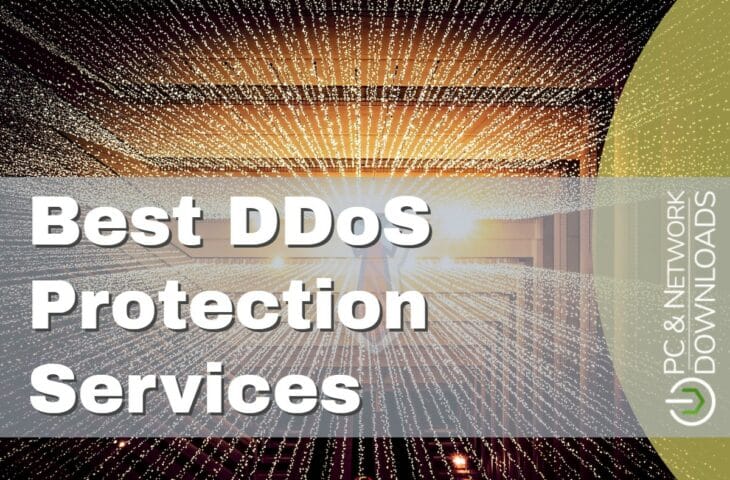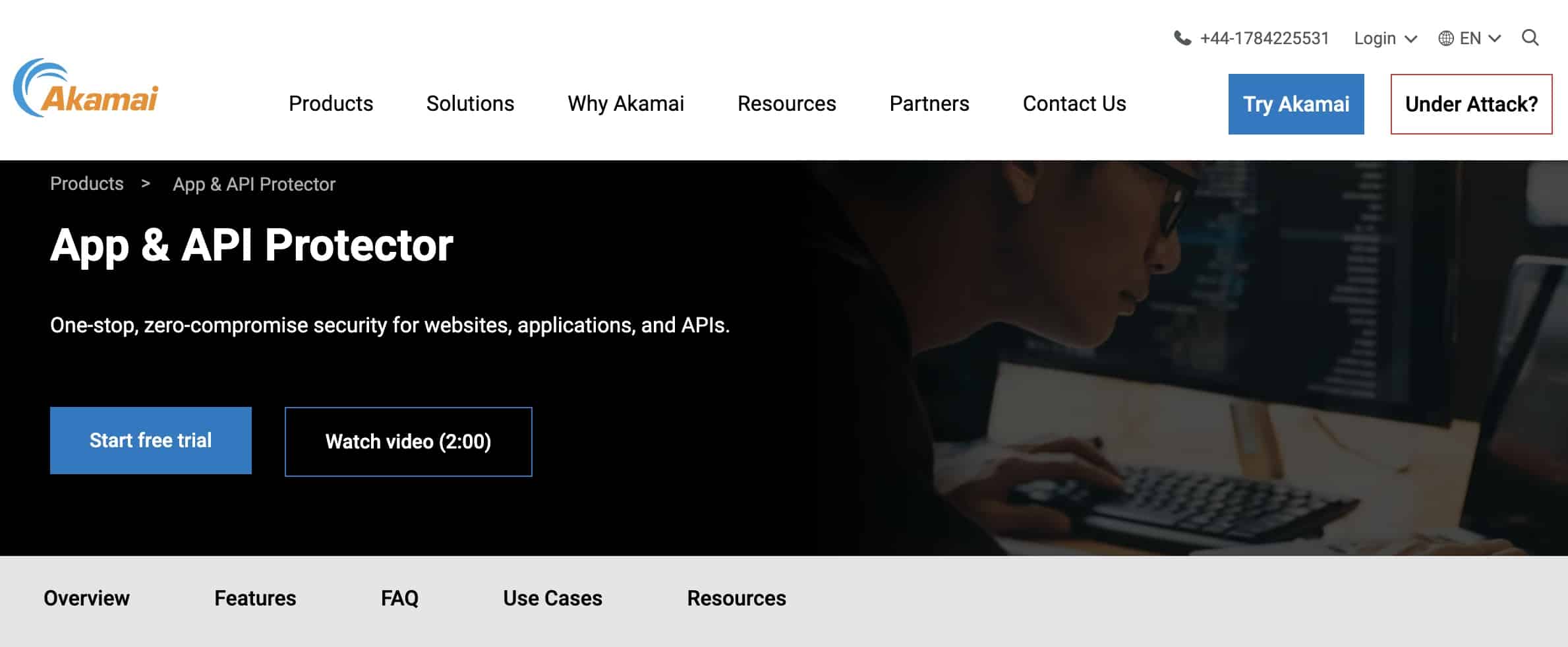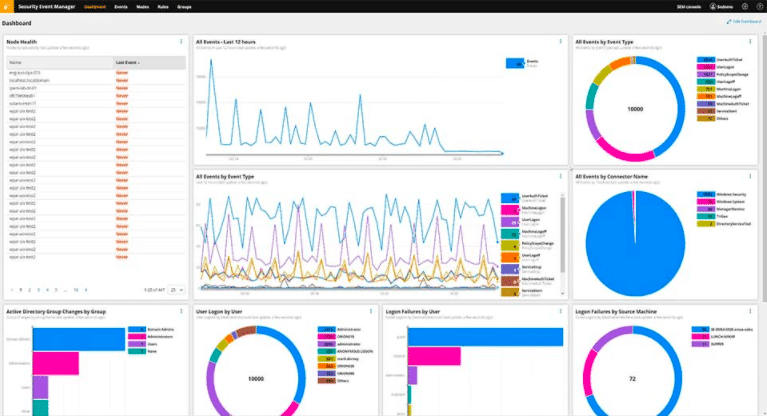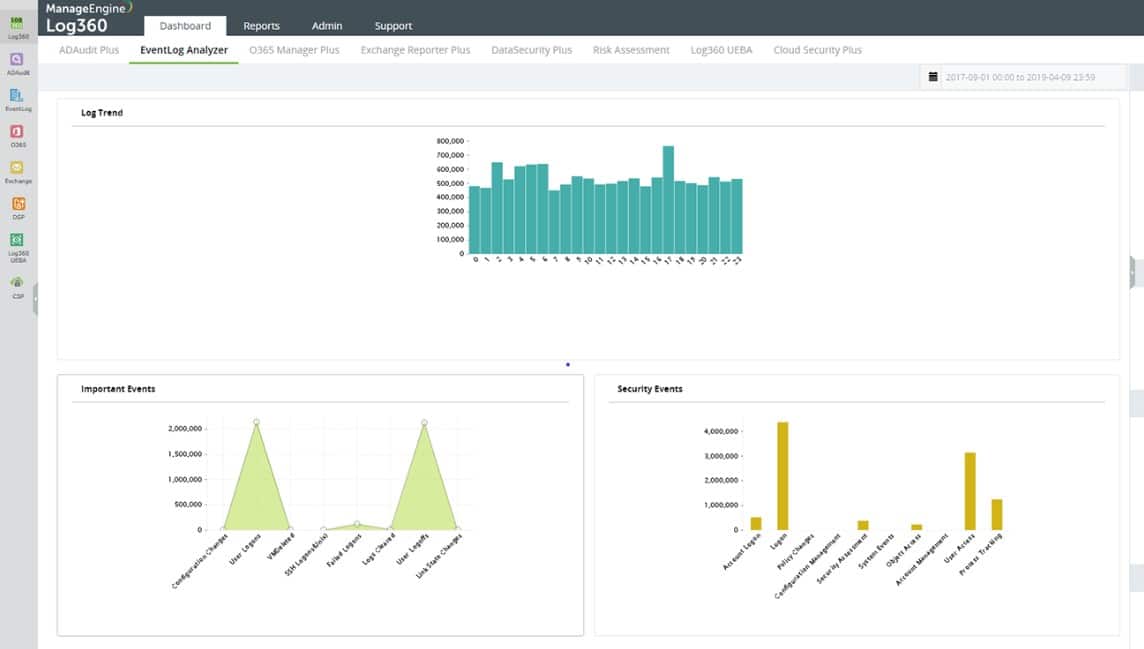We may earn a commission if you make a purchase through the links on our website.
The Best DDoS Protection Services

UPDATED: July 11, 2024
DDoS attacks are evolving— they are becoming more sophisticated and distributed. Now, they are starting to give real headaches to cyber-security experts.
Since the DDoS focus changed from network and transport layers (L3 and L4) to the application layer (L7), DDoS attacks are more challenging to mitigate. The volume of these attacks is also getting out of control. DDoS sources or bots are now distributed to every corner of the earth and into anything connected to the Internet. If something has IP, like cameras, NAS, servers, mobiles, or IoT devices, it can be turned into a bot and commanded to attack.
Here is our list of the best DDoS Protection Services
- SolarWinds Security Event Manager – FREE TRIAL A SIEM solution that uses a multi-layer approach to monitor event logs from many sources, and detect and prevent DDoS activities. Get a 30-day free trial.
- ManageEngine Log360 – FREE TRIAL This large bundle of services is able to identify threats and implement automated responses. Available for Windows Server. Start 30-day free trial.
- Akamai Prolexic It uses Akamai’s massive CDN with scrubbing centers to identify and stop DDoS attacks in the cloud before they reach your assets.
- Sucuri Website Firewall A cloud-based WAF with strong protection from DDoS attacks. It filters, and blocks suspicious DDoS traffic with intelligence and GeoIP detection.
- Cloudflare One of the largest CDN providers that offer protection against 3,4, and 7 layer DDoS attacks at a maximum capacity of 37 Tbps.
- Akamai App and API Protector A WAF built on top of Akamai Intelligent Edge Platform and designed to protect web assets from large DDoS attacks.
- CloudBric’s SWAP A fully-managed web security service with a cloud-based WAF based on artificial intelligence. The Cloudbric SWAP offers protection from Layer 3, 4, and 7 DDoS attacks
So, what can a DDOS protection service do to protect you from a DDoS attack?
- Content Delivery Networks (CDNs) are a great defense against DDoS attacks because they redistribute traffic to edge servers. They eliminate the single point of failure by helping the victim (server) process traffic. CDNs can use DNS or Anycast technology.
- Web Application Firewall (WAF) uses a set of rules, blacklists, or whitelists to filter traffic. Most WAFs use behavior-based rules to measure stress (DDoS attack) against a baseline of “ordinary traffic”.
- DDoS protection mechanisms might also include rate limiting, a dashboard to manage traffic, threat intelligence databases, and managed services with support.
Our methodology for selecting DDoS protection services
We reviewed the market for encrypted DDoS protection systems and analyzed the options based on the following criteria:
- Edge services that filter all traffic on the way to the Web server
- Plans that are suitable for small businesses and others that can protect companies that frequently get attacked by very large attack campaigns
- A platform that provides additional services, such as a content delivery network
- An alert for a detected live attack
- Attack analysis facilities
- A free trial, a demo, or a free plan that enables the service to be validated without paying
- Value for money from a DDoS protection system that is able to absorb very large amounts of traffic without costing too much
With these selection criteria in mind, we explored the market to identify DDoS protection services that can protect against traffic floods and we made sure to include some on-premises options for companies that don’t like using cloud-based systems.
The best DDoS Protection Service
1. SolarWinds Security Event Manager – FREE TRIAL
SolarWinds Security Event Manager (SEM) is a Security Information and Event Management (SIEM) software, that provides real-time analysis of security alerts generated by the network or applications. SolarWinds SEM (formerly Log & Event Manager) is capable of monitoring event logs from many sources and identifying DDoS attacks.
Key Features:
- Automated threat detection and response: This is a SIEM service
- Forensics analysis: Based on log messages
- Cyber threat intelligence: Warns of attack campaigns
- Compliance reporting: For HIPAA, PCI DSS, and SOX
- Attack categorization: Identifies when attacks against the network have started
Why do we recommend it?
While not being a full DDoS protection system, the SolarWinds Security Event Manager can identify DDoS traffic floods and raise an alert. Set up automated responses to manipulate access to the network’s gateway to complete the picture. This package provides detection for a wide range of security threats, not just DDoS attacks.
How can SolarWinds Security Event Manager protect you from DDoS?
SolarWinds SEM uses cyber-threat intelligence sourced from open communities to help identify and block blacklisted IPs. It attempts to go for the Botnet’s Command & Control Center using logs from a wide range of sources.
Who is it recommended for?
This is a good choice for companies that aren’t interested in remote services and want to host all of their security systems themselves. It is a solution for large businesses. As this is a detection service rather than a DDoS absorption tool, companies using the package will need to have other mechanisms in place to respond to attacks.
Pros:
- Enterprise-Focused SIEM: Has a wide range of integrations
- Automated Log Scanning: Also facilities for manual searches
- On-Premises Software: For those who don’t trust cloud systems
- Historical Analysis Tool: Provides attack intelligence after the event
- Log Manager: Collects, consolidates, and files log messages from many sources
Cons:
- No SaaS Option: This package is only available for on-premises hosting on Windows Server
Price: The perpetual license starts at $5,093 and the subscription starts at $2,613. Register to Security Event Manager for a fully-functional 30-day free trial.
EDITOR'S CHOICE
SolarWinds Security Event Manager is our top pick for a DDoS protection service because it isn’t limited to detecting traffic flood attacks. This system will look for all types of threats, which include both manual and automated attacks. The package will look at the possibility of an account takeover, an insider threat, or an intruder – all of which are attacks that happen within the network and wouldn’t be detected by a remote edge service. The service will also identify external attacks and implement automated remediation.
Download: Download a 30-Day Free Trial
Official Site: https://www.solarwinds.com/security-event-manager
OS: Windows Server
2. ManageEngine Log360 – FREE TRIAL
ManageEngine Log360 is a threat detection and response package. This software package is a bundle of tools from ManageEngine that includes protection for cloud systems as well as on-premises resources. The threat-hunting core of the system is a SIEM that collects network activity data as well as log messages from operating systems and applications.
Key Features:
- Activity Tracking: Looks for known patterns of malicious behavior
- Alerts for Unusual Activity: Will detect insider threats, intrusion, and automated attacks
- Threat Intelligence Feed: Provides information on current attack campaigns
- Automated Responses: Shuts down threats
Why do we recommend it?
ManageEngine Log360 is a major rival to the SolarWinds system on this list. It is a general threat detection system that operates search on log messages and network activity feeds. The service will identify a range of threats, both manual and automated. DDoS is just one of the automated attack strategies that this package can identify.
How can ManageEngine Log360 protect against DDoS attacks?
The SIEM gets a threat intelligence feed, which includes a blacklist of IP addresses that are known sources of malicious activity. This will include the addresses of infected zombie sources in botnets and well-known sources for reflection attacks. The system can load this block list into your third-party firewall and reject all malicious traffic.
Who is it recommended for?
This is a solution for large businesses. It is a superpack of several ManageEngine modules – many of which have free editions for small businesses, while Log360 does not. Small companies should look at the components of the Log360 system and work out whether they would get a better deal just buying those elements that they really need.
Pros:
- Security Orchestration, Automation, and Response (SOAR): Pulls in the services of third-party security systems
- Alerts can be Channeled to Ticketing Services: ManageEngine ServiceDesk Plus
- Network and Host Threat Detection: Based on log messages and network activity feeds
- Compliance Reporting: For PCI DSS, GDPR, FISMA, HIPAA, SOX, and GLBA.
Cons:
- Large Bundle of Tools and not Suitable for Small Businesses: SMEs should look at the other modules available for ManageEngine
Price: This is a collection of tools and the price for the bundle is compiled from the individual package prices, so you need to get a quote that calculates the price for your site. You can download the package with a 30-day free trial.
3. Akamai Prolexic

Akamai is one of the leaders in CDN. Among their wide product portfolio, they offer an amazing DDoS protection service known as Akamai Prolexic, which is tailored for data centers. Prolexic is considered one of the fastest DDoS mitigation services with Terabit-scale protection. It comes with a fully-managed DDoS protection service backed up by Akamai’s SOC team 24×7.
Key Features:
- Cloud-Based Proxy Server: Protection from layers 3,4, and 7 DDoS attacks
- Access to Akamai’s 24×7 SOC: Industry-leading time-to-mitigate SLA
- Live Activity Reporting: View traffic data in real time
Why do we recommend it?
Akamai is one of the leading edge service providers and its DDoS protection service is a winner. This service is able to handle any volume of traffic floods and you can combine the service with a package of other edge systems, such as a CDN.
How Prolexic stops DDoS attacks? It uses its large CDN to stop attacks at the cloud before they reach the victim. The L3 (network) traffic is deflected to any of Akamai’s 20 global scrubbing centers where traffic is analyzed and filtered. The Akamai SOC experts analyze traffic, apply an appropriate mitigation strategy, and forward legitimate traffic to its destination.
Who is it recommended for?
This system is suitable for any business. The Akamai platform is a proxy service, so you don’t have to host any software yourself and you don’t need to create gateway capacity to manage large volumes of connection requests. Shield your Web systems from attack – including API protection.
Pros:
- Block Multiple Types of DDoS Attacks: Includes protection against SYN, UDP, and POST floods
- Post-Attack Analysis: Helps improve security posture
- Absorbs Malicious Traffic: Passes on genuine connection requests
Cons:
- No Free Trial: Try the free trial of the App and API Protector instead
Download: Try Akamai’s App and API Protector, a simplified DDoS and Application-Layer Security, free for 30 days.
4. Sucuri Firewall

Sucuri’s Firewall is a cloud-based WAF and Intrusion Prevention Systems (IPS). This comprehensive WAF is designed to protect you from OWASP’s top ten. It can safeguard against Malware, vulnerabilities, hack attempts, zero-day exploits, brute-force attacks, and of course DDoS.
Key Features:
- DDoS Prevention and Mitigation: Available together with a CDN
- Patching and System Hardening: Zero-day exploits prevention
- CDN, Called the Anycast Network: Reduces traffic load and improves delivery speeds
Why do we recommend it?
Sucuri Firewall is a bundle of web application protection services and includes optimization and response time services, such as a CDN. The package is hosted in the cloud and operates as a proxy service. The platform’s DDoS protection system has very large capacity to absorb traffic floods and keeps the web server responding to genuine connection requests.
How does Sucuri help protect from DDoS?
Sucuri’s WAF is capable of mitigating layer 3,4 and 7 DDoS attacks. For Layer 7, it monitors inbound HTTP/HTTPS traffic and performs a browser challenge to validate if requests are coming from a normal browser, and not from a DDoS script. Sucuri also uses Machine Learning (ML) to improve the performance of the behavioral analysis.
Who is it recommended for?
Sucuri provides four plan levels that are offered at a yearly subscription price. This enables the platform to cater to businesses of all sizes. The company doesn’t offer a standalone DDoS service but provides plans that include a list of protection and performance-enhancing systems for websites.
Pros:
- An All-in-One Package: Provides both security and performance enhancements
- A Proxy Service: Stands between the world and your web server
- Custom Traffic Controls: Create your own access blocks by IP address, geolocation, traffic type, and behavior
- Four Package Sizes: Caters to all sizes of businesses
Cons:
- No Self-Hosting Option: Only available as a cloud-based edge platform
Price: Basic ($199.99/yr), Pro ($299.99/yr), and Business ($499.99/yr).
5. Cloudflare

Cloudflare is one of the largest CDNs in the world, composed of hundreds of data centers distributed across +100 countries. Cloudflare is pretty popular for its free tiers, such as its DNS resolution service (1.1.1.1). But the best benefit of Cloudflare’s massive CDN is the protection against malicious traffic.
Key Features:
- Blocks Very Large Traffic Floods: A capacity of 37TB/s
- Simultaneous Protection at Multiple Levels: Protection against attacks at layers 3,4, and 7
- Predictive Security: Maintains an IP address blacklist
Why do we recommend it?
Cloudflare is the world leader in DDoS protection. This was the original, sole service offered by the company and now the provider has expanded its platform to implement many other edge services, which include load balancing, a failover service, and a CDN. The company is also recommended for its DNS management services.
What Cloudflare does to protect you from DDoS attacks? Since it is very likely that traffic going to your web app or site is running through CloudFlare’s network, it will catch it upstream before it hits your server. It can identify DDoS attacks and other botnet-generated traffic like data scraping, or spamming comments.
Who is it recommended for?
Cloudflare has made its services accessible to all businesses and partners with web hosting providers around the world to provide a free entry-level package of web protection services to new website owners. The company also has a long list of very large multinationals in its client base.
Pros:
- Global Network of Data Centers: Constant availability
- DNS Management: Includes a free DNS service
- SSL Certificate Management: Provides free certificates to small businesses
Cons:
- Complicated Menu of Services and Plans: It takes a lot of time to work out which plan to sign up for
Pricing: There are four plans: Free, Pro ($20/month), Business ($200/ month), and Enterprise (get a quote)
Download: Test the free plan for a single personal website.
6. Akamai App and API Protector

Akamai also offers the APP and API Protector which is explicitly designed to protect web apps and sites against sophisticated DDoS attacks, including other common web attacks.
Key Features:
- Vast Content Delivery Network: Approximately 300,000 servers
- Web Application Firewall: Identifies and filters malicious HTTP/HTTPS traffic
- Pre-Configured Layer 7 Firewall Rules: Protects against attacks spread across packet
Why do we recommend it?
Akamai App and API Protector replaces the Akamai Kona Site Defender. This system is a WAF to protect websites and web applications and it is able to perform its security services for sites that are under development as well as those that are live. The package is delivered as a proxy service, so it doesn’t matter where your website is hosted.
Akamai App and API Protector is a cloud-based and highly scalable DDoS protection solution for the enterprise. It provides a multi-layer (Layer 3,4, and 7) protection from the variety of new DDoS attacks. The service deflects L3 (IP, ICMP, ARP) traffic and absorbs L7 (HTTP/HTTPS) at the network edge.
Who is it recommended for?
This system is a strong contender to Cloudflare. However, Akamai doesn’t offer a free edition, so it won’t be able to attract small businesses away from its major rival. This platform will appeal to large corporations that have multiple sites because it can protect multiple sites with one subscription and those assets can all be hosted on different platforms.
Pros:
- Highly Flexible WAF: Great for DevOps teams and more complex networks
- Blacklists: Based on location and IP address
- Supported by Cybersecurity Analysts: The Akamai Threat Intelligence Team
Cons:
- No Free Edition: Better suited for larger companies with multiple web properties
Price: Get a quote.
Download: Get Akamai App and API Protector for free for 30 days.
7. Cloudbric

Cloudbric, headquartered in Seoul, South Korea, is a cybersecurity software development company. Cloudbric’s cloud-based WAF is considered as one of the newest sophisticated solutions to protect against XSS, SQL injections, and DDoS.
Key Features:
- Filters All Types of Traffic Floods: Protects against layers 3,4, and 7 DDoS attacks
- WAF Includes AI Interpolation: Deploys deep learning to recognize attack patterns
- Large Absorption Capacity: Scale up to 20 Tbps
Why do we recommend it?
Cloudbric has developed its proxy service into a full web application and API protection (WAAP) system. It is able to guard websites from a range of attacks as well as prevent web servers from being overwhelmed by traffic floods. The platform also offers a ZTNA service for cloud application fencing.
Cloudbric’s WAF uses Smart Web Application Protection (SWAP), which is Cloudbric’s patented mechanism that employs AI (pattern matching, semantics, and heuristic analysis) and a set of rulesets to identify and stop attacks.
Who is it recommended for?
The WAAP will interest any business that runs websites. As it is a proxy service, it doesn’t matter whether you host your website yourself or on a hosting service, it will protect the site. It can also protect multiple sites within one account and they can be hosted in different locations.
Pros:
- Fully Managed DDoS Service: Great for hands-off protection
- Integrates with Third-Party CDNs: Cloudbric does not offer CDN
- Provides Complete Protection: Scans across multiple network layers
Cons:
- No Price List: You have to ask for a quote
Free trial: Contact Cloudbric to get a free trial
Other DDoS Protection Services Worth Mentioning
- Link11. Leading IT security company with patented DDoS protection for websites and IT infrastructure. Link11 Web Security Suite includes DDoS protection for web, Bot management, Zero-touch WAF, threat intelligence, and Secure CDN.
- AWS Shield. Amazon Web Services (AWS) Shield is DDoS protection managed service for applications running on AWS. An advantage of AWS Shield is that it is backed up by AWS’s CloudFront CDN and Route53 DNS service. AWS Shield provides protection for Layer3,4, and 7.
- Imperva is a multi-cloud platform designed to protect apps, edge, and databases. Imperva offers a cloud-based DDoS protection service that includes 44+ DDoS scrubbing centers, protection from 6 Tbps, and protection from layers 3,4, and 7.
Conclusion
The best strategy against DDoS attacks is to prepare beforehand. A successful DDoS attack can damage an entire business’s revenue, reputation, and productivity. Waiting until you are under attack and then look for help, is not a good solution.
Although a DDoS protection service will not stop the attack— it will mitigate it. It will make it less hostile so that your server can still respond to legitimate traffic— until the DDoS attacker runs out of resources.
To protect your IT infrastructure, on-premises tools like SolarWinds Security Event Manager or Akamai Prolexic Routed will do a great job. For distributed web apps, use a combination of large CDNs with intelligent WAFs. Akamai and Cloudflare have the largest CDNs+WAF. But Sucuri WAF and IndusFace AppTrana have intelligent filtering systems.

